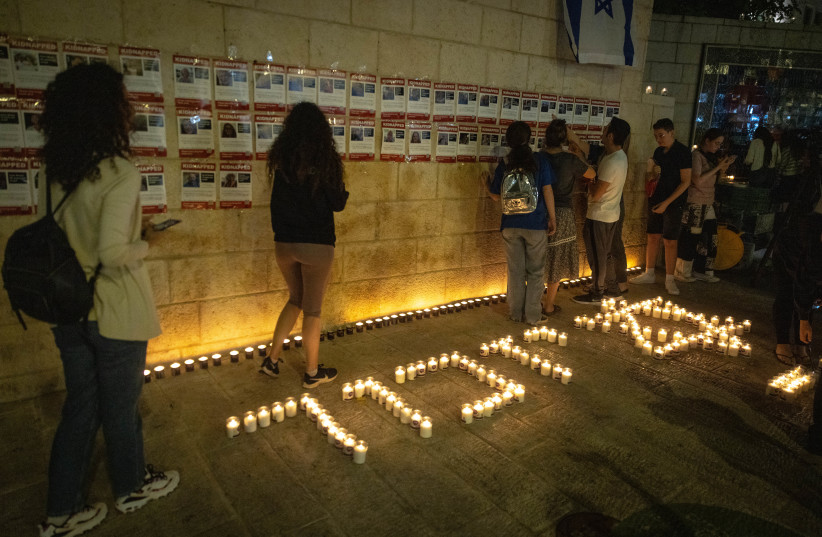Throughout the country, ceremonies took place on Sunday to mark the shloshim of the October 7 massacre by Hamas, which resulted in the murder of over 1,400 people and the kidnapping of an additional 240, still unaccounted for in Gaza.
Reaching the 30-day mark after death is a meaningful moment for Jewish grieving. The secondary period of ritual mourning – following shiva – is lifted for anyone who has lost a family member. This particular shloshim is a national one, not just a personal one.
But the cloud of mourning will carry on for much longer, not only for the Israelis who lost someone on October 7 or in the ensuing month since the country launched its righteous war against Hamas. For those whose loved ones’ fate is still unknown, whether being used as hostages and human shields by Hamas somewhere in a Gaza tunnel, or murdered but still not located or identified, the mourning and grief are as deep and painful as they were a month ago.
As Rabbi Menachem Creditor, the rabbi-in-residence at UJA-Federation of New York, told JTA this week, marking October 7 “is uncharted territory. Not since the Shoah have we had to deal with this massive scale of grief.”
Of course, the shloshim is just a round number, since the national calamity on October 7 doesn’t coincide with the funeral of victims. Burials in many cases did not happen on the swift timeline prescribed by Judaism, because of the dangers and difficulties in retrieving their bodies. The remains of some victims are still being identified, and other victims are still dying due to their injuries.

On top of that, the country has lost more than two dozen soldiers since the beginning of the war, and the longer Israel remains in Gaza, that number is bound to increase.
However, the shloshim is still a watershed moment for anyone who experienced the cataclysmic events that changed the country forever on October 7.
President Isaac Herzog called on people in Israel and around the world to light memorial candles, sharing his initiative with the hashtag #The_Light_Will_Overcome.
At many sites, there were ceremonies with candles or torches being lit, speeches, performances and the singing of “Hatikva.” Many also had installations set up with 240 empty chairs displaying the names and photos of the children, elderly, and people of all ages being held against international law in Gaza, without any confirmation of their whereabouts and without any access to the Red Cross or any other international humanitarian offices.
Ceremonies were slated to be held abroad a day later abroad, as Jewish communities around the world join in the grief of their Israeli brethren, even as large pro-Hamas demonstrations (disguised as pro-ceasefire demonstrations) are being held in world capitals and the incidents of antisemitism are skyrocketing.
Unity and mourning
The unity being displayed in the country and in the Diaspora is one ray of light that has emerged during this shloshim period. One of the oft-repeated words used by officials in the government, the army, and the home front over the last month has been “hosen” – resilience.
If nothing else, this month of shock, mourning, and action – whether it be militarily or on the home front, where the level of volunteerism and helping the displaced has been unprecedented – has demonstrated just how resilient Israelis are.
The country’s spirit may have lost its breath with the sneak sucker punch Hamas delivered on October 7, but the way in which the people rebounded and have risen to the task at hand to heal the grieving, help those in need, and ensure that something like this never happens again is a testament to the values upon which Israel was founded.
The ceremonies on Sunday night ended with participants standing and singing the national anthem. Never before have the words rung more true and been delivered with more conviction.
‘As long as within our hearts
The Jewish soul sings,
As long as forward to the East
To Zion, looks the eye –
Our hope is not yet lost,
It is two thousand years old,
To be a free people in our land
The land of Zion and Jerusalem.’
After this shloshim, it’s safe to say that Israel’s spirit has not been broken, and it will prevail.
